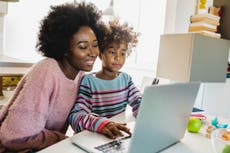Pandemic schooling at home is not homeschooling – this is why lesson failures are OK
Trying to force parents, children, and teachers to replicate traditional education online in the home is both punishing and pointless
When the schools closed in 2020, friends said to me, “You’re ok, it’s normal for you”. To some extent this was true. My husband and I work online from home and our 13-year-old son has always been home-educated. What we were experiencing though was not normal, particularly as our child is medically vulnerable.
Our normal home-learning includes trips to museums, meet-ups with friends, swimming, cinema outings, family travel, and more. It’s enriching for all of us. Now, we keep hearing about the “lost generation” and “long-term damage” of being out of school. My son feels angry. He wants to know if that’s how the world sees him, as a home-educated child? He’s furious at having his future written off so casually. Learning at home does not mean your life is ruined and this language reveals a lot about how homeschooling is perceived.
I’ve grown used to children assuming my son can’t read or write because he doesn’t go to school. They’re often surprised to hear that whilst education is compulsory, school is not. I’ve learned to accept the inevitable “What about socialisation? What about GCSEs?” questions. It seems the general perception of regular homeschooling children is that they spend their days locked away, destined for a life of illiterate delinquency. The reality, of course, is far from this. My son is a voracious reader, is interested in subjects from chemistry to engineering to art, plays piano and guitar, and is confident in social situations. As to whether he will do GCSEs? He might choose to, or he might make different choices. His route is not fixed.
But these are not normal times for any of us and pandemic schooling at home is not the same as homeschooling. Trying to force parents, children, and teachers to replicate traditional education online in the home is both punishing and pointless. Author and educator John Holt said: “What is most important and valuable about the home as a base for children’s growth into the world is not that it is a better school than the schools, but that it isn't a school at all.”
These are, as we frequently hear, unprecedented times. Why then, is the Department for Education insisting teachers, students, and parents try to replicate school at home? Holt pioneered the term “radical unschooling”, which assumes that all children are curious learners and every experience is an opportunity to learn and grow. This can be challenging to trust but maybe it’s what we need right now?
When my son was seven, we spent a year caring for my mother. It was exhausting and traumatic yet, when nurses asked my son what he was learning, I felt guilty. I wasn’t managing formal lessons. I was a bad mother. The guiltier I felt, the harder I tried. One day, after yet another failed maths lesson (it isn’t my strongest subject) my son and I sat crying on the floor. This way wasn’t going to work, for either of us. I put away the maths books, got out the paints and, for the next three hours, we painted the garden shed, path, and ourselves until everything was a mess of colour. We ended the day laughing and the shed, though worn now, still makes people smile.
At the end of that year, my son’s life was not ruined. What did he learn? Playing Minecraft online gave him excellent keyboard skills and a strong sense of digital citizenship. Witnessing end-of-life care gave him the opportunity to learn about resilience and compassion. Being there when my mother died helped him learn how to process loss. Learning that it was okay to listen to his needs helped him articulate his feelings. We both grew, and we never returned to formal lessons.
Right now, our priority is learning how to live through extraordinary times. To do so, we need to be flexible, not rigid. Maybe, instead of worrying about algebra, we need to learn how to slow down and give time to our needs. Instead of testing, maybe we need to reflect on our collective grief and fear as we live through it. In place of Zoom classes, maybe we can develop skills in sustaining joyful human connections in a rapidly changing digital world?
This is a time for simple acts of radical gentleness. In the end, it is about loving ourselves, and each other, enough to get through this in one piece, even if that means playing hooky once in a while. The world won’t end if you do. It will be okay.
Victoria Bennett is a writer, creative producer, and full-time home educating mother to a teenage son
Join our commenting forum
Join thought-provoking conversations, follow other Independent readers and see their replies
Comments


Bookmark popover
Removed from bookmarks